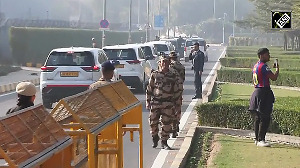 All car makers are planning a one to three per cent raise in prices from April 1, on account of new emission norms and also to offset rising input costs.
All car makers are planning a one to three per cent raise in prices from April 1, on account of new emission norms and also to offset rising input costs.
The rise is expected to be a minimum of Rs 2,000 on a mini car, going up to Rs 71,000 on a high-end luxury sedan.
The hike is primarily driven by spiralling raw material costs, on an upward trajectory over the past two to three months, say manufacturers.
Changes in the emission regulations from April 1, which make it mandatory to produce vehicles that suit the Bharat Stage IV (BS IV) emission norms in 13 notified cities, is also responsible for this. Manufacturers are required to upgrade their entire range of cars to BS IV level, by making engineering changes.
While the 13 cities -- those in the National Capital Region, Mumbai, Kolkata, Hyderabad, Chennai, Bangalore, Ahmedabad, Surat, Pune, Kanpur and Agra -- would be upgraded to BS IV levels, the rest of the country will be upgraded to BS III, currently prevalent in those same 13 cities.
P Balendran, director and vice president, corporate affairs, General Motors, said: "We will be hiking our prices in the range of 1-1.5 per cent from April 1.
The hike will be made across the product range, except the newly launched products, Cruze and Beat."
This will be the third time in this calendar year that manufacturers would be raising their prices. Almost all companies had marginally raised prices in January, a result of high commodity prices.
| EXPENSIVE DRIVE | ||
| Company | Increase (%) |
Value (In Rs) |
| General Motors | 1-1.5 | 3,300-28,000 |
| Hyundai | 3-Jan | 2,800-52,000 |
| Maruti | 1-2* | 2,400-28,000 |
| Honda Siel | 1-2* | 11,000-40,000 |
| Toyota | 3-Feb | 15,000-71,000 |
| Tata Motors | 1-1.5* | 3,000-12,000 |
| Mahindra | 1-2* | 6,800-12,000 |
| Ford | 2-Jan | 4,500-35,000 |
| *Expected | ||
This was followed by another in February, after a partial withdrawal of stimulus in the budget.
Prices of auto-grade steel have moved double-digit upwards over the past three to four months. Steel constitutes almost half the cost of a car's raw material. Besides, prices of other inputs such as rubber, copper, plastics and aluminium have also moved up significantly.
Sandeep Singh, joint managing director, Toyota Kirloskar Motors, said: "Yes, we will also be increasing (our prices) due to (the change to) BS IV and increase in cost of inputs. The hike will be in the range of 2-3 per cent."
Similarly, Hyundai Motor India, the country's second biggest maker and largest exporter, would also exercise a rise with the diesel range witnessing the highest increase of up to three per cent, while petrol models will see an increase of one to two per cent.
Maruti Suzuki, the biggest car maker, hasn't specified the quantum of increase but confirmed the mounting pressure on cost of raw materials and change in norms will bring about a hike from April 1.
Sources say a favourable sales run over many months, which helped Maruti post its highest sales in a year since its inception, has given the company some room to raise prices by at least one to two per cent.
Experts say there will be continued pressure from raw materials in the coming quarters, which will be in line with the expected high inflation levels. Further, lending rates are also expected to harden, as banks will raise interest rates on vehicle loans in the coming months.






